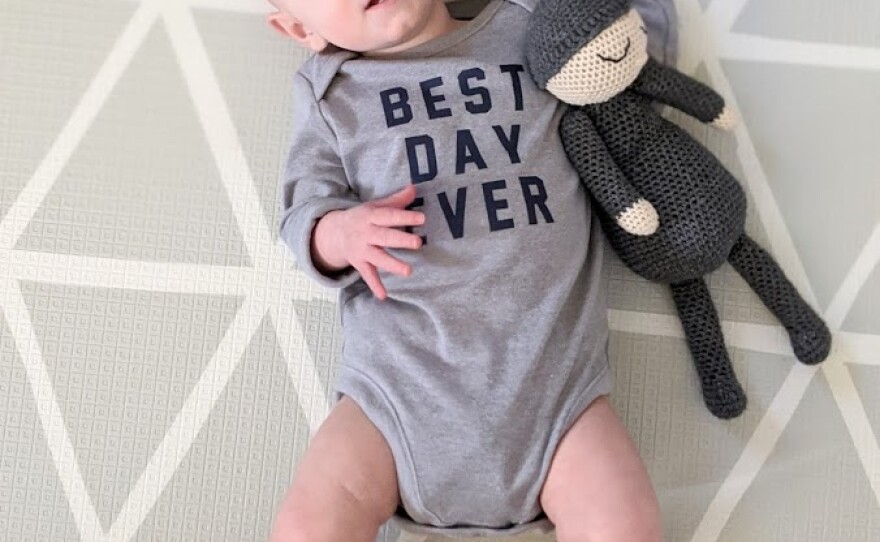Parents who've spent time in the neonatal intensive care unit (NICU) carry anxiety with them even after their baby is released.
The NICU's constant barrage of doctors and beeping monitors is traumatic — and that trauma lingers.
Kepley Wakefield approaches life with typical 13-month-old vigor. A lot of smiling, excellent crawling acceleration and a fair amount of shrieking.
Her parents Courtney and Hollis Wakefield cherish her. They were by her side for each of the 95 days Kepley spent in the NICU.

"I had some bleeding at 21 weeks. So at that point, they put me on bed rest and we were having really difficult conversations," Hollis said. "Viability is considered 24, so we had like two-and-a-half or three weeks to get through — which was a really, really scary time."
Giving Birth At 24 Weeks
Hollis knew her pregnancy was going to be high risk. She was a 39-year-old cervical cancer survivor, so she and her wife had a plan for early labor. Even they weren't prepared for delivery at 24 weeks, five days. But that's when Kepley arrived, at 1 lb 10 ounces. The NICU team braced the Dallas couple for a long and frustrating road.
"They told us it would be like a rollercoaster," Hollis said. "They were like it's going to be, you know, minute-to-minute some days. It's not a straight line at all."
Kepley started out in the NICU at UT-Southwestern's Clements University Hospital, but eventually moved to the higher level NICU just down the road at Children's Medical Center in Dallas. She was on a ventilator for three months.
When she was discharged, she still was tiny not even five pounds. She still needed supplementary oxygen and had weekly doctors appointments. Courtney says the stress from the NICU followed them home.
"I'm anxious all the time," she said. "I have said, I have not been myself since Kepley was born."
At-Home Risks
Because Kepley was born so early, her lungs weren't fully developed. And because a ventilator helped her breathe for so long, those tiny lungs were also damaged. So even though Kepley is now thriving, flu season is a real threat. Her parents second guess every public outing, even quick trips to the store.
"And you're thinking, do we risk it? Are we both going to be home where one of us could stay home?" Courtney said. "Just kind having to deal with that, even just for day-to-day tasks that we might normally bring a baby to. We're having to kind of think twice."
That's not an overreaction. Doctors say catching a respiratory virus like RSV or the flu might put a premature baby right back in the hospital, which could re-traumatize those parents who've already spent time in the NICU.
Dr. Rashmin Savani is the chief of neonatal medicine at Children's Health and UT Southwestern. He says even just the noise of endlessly beeping NICU monitors can overwhelm parents.
"The medical team and the nursing team they're phenomenal, they understand what all these beeps are and when to respond, when to not respond." Savani said. "But the family is bombarded with this sort of cacophony of alarms that are all designed to say 'hey, pay attention to me.' But for the family, it's really scary."
Children's Health has a support crew in place to handle everything but the medicine. Every family has access to a team that includes a social worker, a psychologist and a chaplain.
'Cutting The Umbilical Cord The Second Time'
Dr. Savani says Children's Health also has a team devoted to helping a family transition to home — learning the ins and outs of complicated equipment and medication, as well as making sure the house is set up for a preemie, without the constant surveillance of doctors and nurses.

"And I actually call it you're cutting the umbilical cord the second time," he said. "And it's a very scary thing for parents to go through."
Hollis and Courtney Wakefield have been there. And while some things about caring for a preemie are old hat by now, they say some of those visceral NICU memories will never fade. There's a visual reminder in the house too — a strand of colorful beads, so long it could wrap around Kepley's tiny waist a dozen times. Courtney says each bead stands for something different Kepley went through in the NICU, for example: blood draws, surgeries and overnight stays.
One day, Kepley might decide to hang these beads on the wall — a memento of her earliest triumph.
For now though, she's happy to use them as a teething toy.









